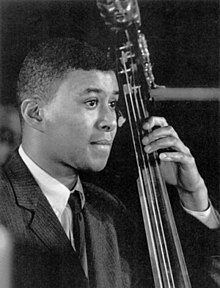music.wikisort.org - Chanteur
Paul Laurence Dunbar Chambers, Jr. (né à Pittsburgh en Pennsylvanie le et mort le ) est un contrebassiste de jazz américain des années 1950 et 1960.
Pour les articles homonymes, voir Chambers.
Ne pas confondre avec l'individu impliqué dans l'affaire Paul Chambers
| Nom de naissance | Paul Laurence Dunbar Chambers, Jr. |
|---|---|
| Naissance |
Pittsburgh, États-Unis |
| Décès | (à 33 ans) |
| Genre musical | Jazz, bebop, hard bop, jazz modal |
Biographie
Né à Pittsburgh, Pennsylvanie le , Paul Chambers grandit à Détroit, dans l’État du Michigan, après le décès de sa mère. Il commence à jouer de la musique avec plusieurs de ses camarades de classe. L'euphonium est en fait son premier instrument[1] puis vient le tuba, mais il ne lui convient pas davantage (« Je ne m’en sortais pas trop mal, mais c’était quelque chose que de le porter durant les longues parades et je n’aimais pas trop cet instrument »). Paul Chambers adopte la contrebasse en 1949[1]. Il se met vraiment à l’instrument au début de l’année 1952, quand il prend des leçons avec un bassiste du Detroit Symphony Orchestra. Il joue de la musique classique avec le Detroit String Band, ensemble qui avait pour fonction de répéter les morceaux de l’orchestre symphonique. Il étudie encore à la Cass Technical High School de 1952 à 1955. Fort de cet apprentissage, il quitte finalement New York sur l’invitation du saxophoniste Paul Quinichette[1].
Paul Chambers gagne en importance en tournant avec des musiciens comme Bennie Green, Quinichette, George Wallington, J. J. Johnson et Kai Winding. En 1955 il rejoint le Miles Davis quintet, dans lequel il reste jusqu’en 1963. Il enregistre plusieurs de ses classiques, notamment Kind of Blue – le premier morceau de ce disque, So What, qui ouvre avec une brève introduction jouée en duo avec le pianiste Bill Evans, et constitue l’une de ses performances les plus notables. Par la suite, de 1963 à 1968, le jazzman joue avec le Wynton Kelly trio. Il continue aussi à enregistrer pour d’autres grands noms du jazz tout au long de sa carrière, comme John Coltrane, Art Blakey et Sonny Rollins.
Sur la fin de sa vie, Paul Chambers devient non seulement dépendant de l’alcool mais aussi de l’héroïne. Il décède prématurément le d’une tuberculose, à l’âge de 33 ans.
Influence
Son importance peut être mesurée non seulement par l'ampleur de son travail dans une courte période mais aussi par sa maîtrise artistique et technique.
Paul Chambers a enregistré avec les plus importants jazzmen de son époque, notamment Cannonball Adderley, Donald Byrd, Sonny Rollins, Freddie Hubbard, Bud Powell, Bill Evans, Herbie Hancock, Lee Morgan, Art Blakey, Wayne Shorter, Paul Quinichette, Sonny Clark, Wes Montgomery, Miles Davis, John Coltrane et Art Pepper.
Il a participé à l'enregistrement d'albums notoires comme Giant Steps de John Coltrane ou Kind of Blue de Miles Davis.
De nombreux musiciens ont écrit des morceaux en hommage à Paul Chambers, on peut notamment citer:
- Mr. P.C. de John Coltrane
- Big Paul de Tommy Flanagan
- Paul's Pal de Sonny Rollins
- The P.C. Blues de Red Garland
Discographie
En tant que leader
|
En tant que coleader
|
En tant que sideman
|
Julian Cannonball Adderley
Nat Adderley
Toshiko Akiyoshi
Lorez Alexandria
Chet Baker
Kenny Burrell
Kenny Burrell et John Coltrane
Sonny Clark
Jimmy Cleveland
Al Cohn & Prestige All Stars
John Coltrane
Miles Davis
Kenny Dorham
Kenny Drew
Bill Evans
Curtis Fuller
Red Garland
|
Barry Harris
Benny Golson
Dexter Gordon
Joe Henderson
Elmo Hope
Milt "Bags" Jackson
John Jenkins
J. J. Johnson
Wynton Kelly
Michel Legrand
Abbey Lincoln
Jackie McLean
Hank Mobley
Wes Montgomery
Thelonius Monk
Lee Morgan
Oliver Nelson
Art Pepper
Ike Quebec
Sonny Red
Freddie Redd
Sonny Rollins
A.K. Salim
Louis Smith
Frank Strozier
Art Taylor
Stanley Turrentine
Kai Winding
|
Notes et références
Liens externes
- Notices d'autorité :
- Fichier d’autorité international virtuel
- International Standard Name Identifier
- Bibliothèque nationale de France (données)
- Système universitaire de documentation
- Bibliothèque du Congrès
- Gemeinsame Normdatei
- Service bibliothécaire national
- Bibliothèque royale des Pays-Bas
- Bibliothèque nationale de Pologne
- Bibliothèque nationale d’Israël
- Bibliothèque universitaire de Pologne
- Bibliothèque nationale de Suède
- Bibliothèque nationale tchèque
- WorldCat
- http://www.universalis.fr/encyclopedie/paul-chambers/
- Portail du jazz
- Portail des États-Unis
- Portail des Afro-Américains
На других языках
[en] Paul Chambers
Paul Laurence Dunbar Chambers Jr. (April 22, 1935 – January 4, 1969)[1] was an American jazz double bassist. A fixture of rhythm sections during the 1950s and 1960s, he has become one of the most widely-known jazz bassists of the hard bop era.[2] He was also known for his bowed solos.[3][4] Chambers recorded about a dozen albums as a leader or co-leader, and over 100 more as a sideman, especially as the anchor of trumpeter Miles Davis's "first great quintet" (1955–63) and with pianist Wynton Kelly (1963–68).[es] Paul Chambers (músico)
Paul Lawrence Dunbar Chambers, Jr. (Pittsburgh, Pensilvania; 22 de abril de 1935-Nueva York, 4 de enero de 1969) fue un contrabajista estadounidense de jazz cultivador del hard bop, especialmente exitoso entre 1955 y 1965 y reconocido como uno de los primeros músicos de jazz en ejecutar solos creativos con el bajo con la técnica de pizzicato y el arco. Chambers trabajó junto a músicos como Miles Davis, Sonny Rollins, John Coltrane, Cannonball Adderley, Donald Byrd, Bud Powell y Freddie Hubbard.- [fr] Paul Chambers
Другой контент может иметь иную лицензию. Перед использованием материалов сайта WikiSort.org внимательно изучите правила лицензирования конкретных элементов наполнения сайта.
WikiSort.org - проект по пересортировке и дополнению контента Википедии
